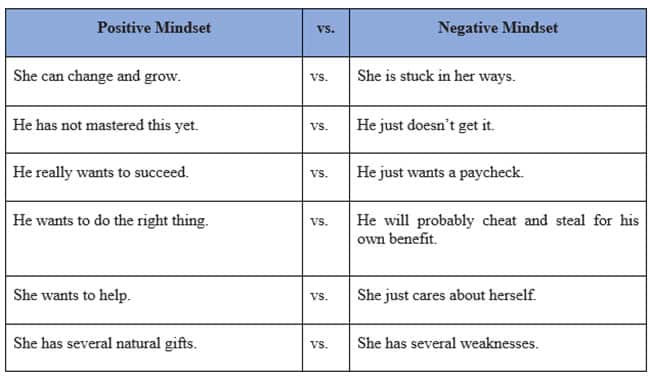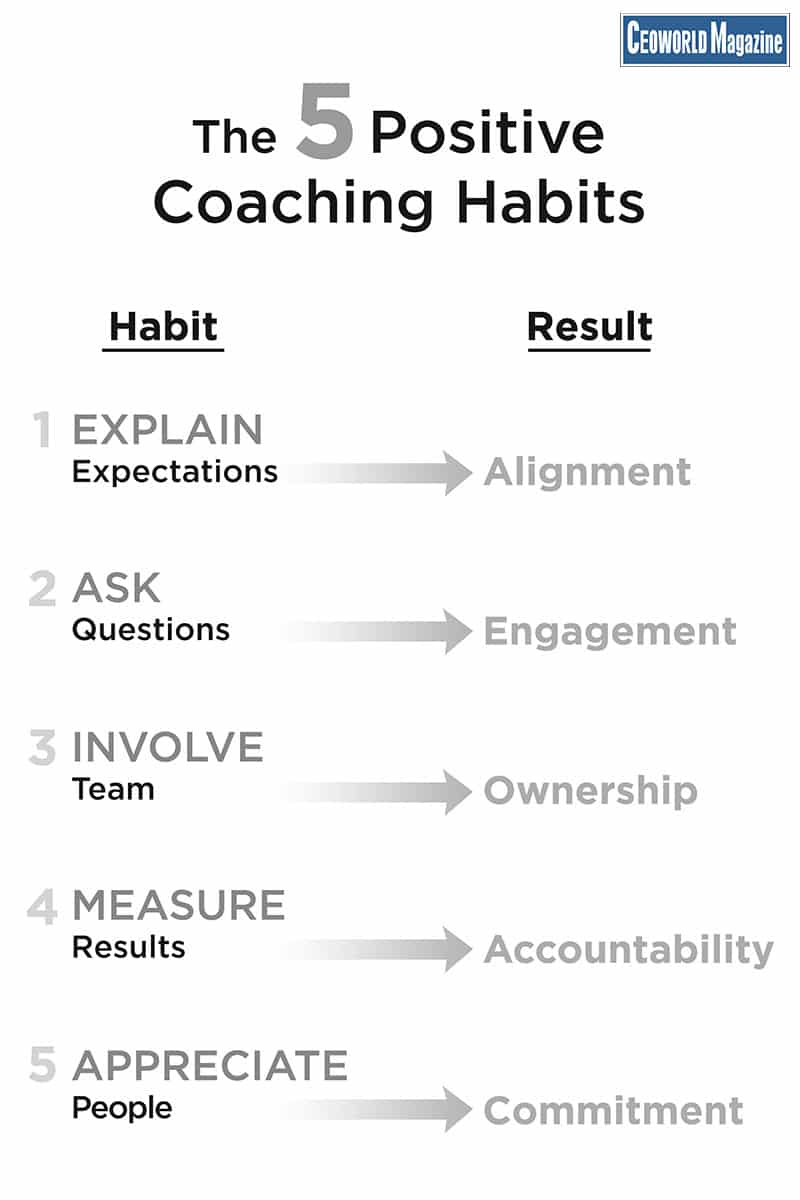The Power of Positive Coaching

It wasn’t too long ago that having a business coach was like having a scarlet letter on your professional suit. Back then, most coaching was remedial—there was a problem that needed to be fixed. Today, having a coach has been elevated in status.
Business leaders have realized what professional athletes have always known—having a coach produces better results. That’s a significant and necessary paradigm shift. Instead of symbolizing a problem, having a coach symbolizes a leader’s willingness to develop and grow as a person and a leader.
A commitment to coaching signals an organization’s willingness to invest in its people. In today’s environment of high-velocity change, factors like technology, product innovation, and unique distribution channels are fleeting advantages.
In fact, the only sustainable competitive advantage is an organization’s talent, and that talent delivers its product or service. The coaching value chain directly links a leader’s ability to coach his or her team with sustained growth and profitability:
Inspiring leaders coach teams to
Build winning relationships internally and externally and
Generate winning results that
Produce sustained growth and profits.
Unfortunately, not every organization has the resources to hire external coaches. Therefore, it’s critical for business leaders to be equipped as effective and inspiring coaches to their teams.
Positive Mindset and Habits
Inspiring winning results and relationships is a two-dimensional challenge that involves a positive coaching mindset and positive coaching habits. Having only one or the other is insufficient to equip leaders to coach effectively and inspire their teams optimally. Most coaching books and workshops focus on skills and habits, which are essential. You can perform all the right skills, but without the right mindset, those skills and habits will not yield the response and results you want from your team.
On the other hand, the right mindset is crucial, but without corresponding coaching habits, you will never see that mindset translated into coaching behaviors. A positive coaching mindset and positive coaching habits go hand in hand, and they have more than a proportional relationship. Your coaching mindset has a multiplier effect on your coaching habits. This relationship between mindset and habits can be expressed in a simple equation:
Positive Coaching Mindset
×
Positive Coaching Habits
=
Winning Results and Relationships
Positive Coaching Mindset
Your mindset has a significant influence on how you perform, lead, and coach. Psychologist Carol Dweck asserts, based on decades of research, that how we see ourselves is a major factor in what we ultimately achieve.1 You will rise to the level of expectations of yourself. What is your current mindset? Do you think you can change, improve, achieve, lead, and coach with excellence?
Your mindset also has a dramatic impact on those you coach. People rise to the level of your expectations for them. A recent study by Korn Ferry Institute found that 65 percent of female chief executive officers (CEOs) from large companies realized they could be a CEO only after someone told them they could be a CEO.2 At first glance, this statistic might seem shocking. But consider how often you have observed an average employee under an average leader begin to flourish once he or she is assigned to an inspiring leader who sees the potential in that employee. Just like these female CEOs, you and those you coach will rise to the level of expectations. Your mindset about yourself and others is one of the very best predictors of the winning results and relationships you will inspire. It is the coach’s mindset and expectations that make all the difference.
Your mindset predisposes you to see behaviors that reinforce your mindset, negative or positive. Sure, your employees can be frustrating and noncompliant at times. That’s why it is so important to bring a positive mind- set to the relationship. If your mindset is, “This team member is difficult and not collaborative,” you are already predisposed to look for, and predictably find, behaviors that reinforce this negative mindset. If your mindset is, “I think this employee can stretch herself and really lead this project successfully,” you will likely look for and find skills and behaviors that support your mindset. This is known as confirmation bias, which is the tendency to search for, interpret, favor, and recall information in a way that confirms your pre-existing beliefs. As a coach, consider what you will see and the different outcomes you can expect if you choose the positive coaching mindset on the left versus the negative one on the right.

Researchers illustrated the power of mindset by proving that managers who used a strength-based approach with their employees helped to improve employee performance by 36.4 percent. On the other hand, managers who focused primarily on the employees’ weaknesses helped to decrease their employees’ performance by 26.8 percent.3 If you are committed to winning results and relationships, then choosing a positive coaching mindset is an easy choice because it is the only choice.
Excellence, like leadership, is built from the inside out. Your organization’s excellence will rarely exceed your team’s excellence, and your team’s excellence will rarely exceed your personal excellence. Therefore, the most important question a leader should ask is: “What am I currently doing to improve my personal leadership?” Inspiring coaches work on themselves before they work on their teams. It starts inside with an understanding of yourself. A positive coaching mindset is built on a foundation of self-knowledge. Inspiring coaches intentionally, courageously, and consistently deepen four levels of self-awareness to build a positive coaching mindset:
- Know Your Thoughts
- Know Your Purpose
- Know Your Values
- Know Your Emotions
Keen awareness at these four levels enables you to be more personally effective, authentic, and credible. Just as importantly, seeking greater self-awareness creates a culture that is conducive to coaching and a team that is more responsive to your coaching.
Positive Coaching Habits
Your coaching mindset will set the limits for the level of impact your coaching habits will have on your team’s performance. A positive coaching mindset enables you to authentically and effectively apply the coaching habits and reap the ultimate benefit: winning results and relationships. On the other hand, with a negative coaching mindset, your coaching habits will inhibit your ability to inspire your team and yield less-than-optimal results.
There are five positive coaching habits. When they are applied with a positive coaching mindset, you will predictably inspire winning results and relationships. These five habits give your team the biggest boost if applied in sequence, but you should still use your knowledge of each team member to determine when to accelerate through or spend more time on a specific habit.
The root meaning of the verb “to coach” means to bring a person from where he or she is to where he or she wants to be. The inspiring coach focuses more on developing a person’s natural gifts, so each team member can realize his or her potential while shoring up weaknesses to help each team member master his or her job.
Consider the role of a football coach. He sets clear expectations for his team with a game plan to win. He asks players if they have any questions to ensure they are clear about their respective roles on the team. He also asks them questions like, “How can you improve your performance or overcome a certain obstacle?” Then during the game, he involves them in changing the game plan, if necessary, based on what they are seeing on the field. The coach also observes and measures each player’s performance (e.g., number of tackles, yards gained, etc.). Finally, the coach gives constructive feedback and recognition, so his players can elevate their performance in the next game.
These are the five positive habits that inspiring coaches in business practice to build winning teams:
- Inspiring coaches explain expectations. They take the time to ensure alignment with their teams before moving forward.
- Inspiring coaches ask questions. They ask to clarify a problem or ask for ideas and suggestions. Asking questions ignites employee engagement.
- Inspiring coaches involve team members in creating solutions to improve their work. This enlists ownership because people are committed to things they help create.
- Inspiring coaches measure results diligently to boost team accountability.
- Inspiring coaches appreciate people. This builds commitment to sustaining and improving results.
Using each of these habits in concert elevates team performance.

The left side of this model shows five positive coaching habits that inspire winning results and relationships. This is the side of choice. Each day, coaches choose whether to take these actions. Their choices influence the right side of this model: the results.
If you choose your habits, then you must take responsibility for your results. You are responsible for the choices you make and for the results you ultimately achieve. If you choose not to build these coaching habits, you must accept these predictable outcomes:
- Instead of Alignment, you get Confusion
- Instead of Engagement, you get Disengagement
- Instead of Ownership, you get Entitlement
- Instead of Accountability, you get Blame
- Instead of Commitment, you get Compliance
These positive coaching habits are based on natural human dynamics and needs. That’s why it does not look like rocket science and seems so simple. That’s also why these habits work across generations, industries, and cultures; they meet universal human needs in the workplace. It is easy for one thing or another to get in the way of these habits, but if you say “yes” to those things, you are saying “no” to winning results and relationships. Positive coaching is not a “salt and pepper” practice. You cannot sprinkle on a little explaining here and appreciation there and expect winning results or relationships. You must perform these habits consistently. If world-class athletes need a coach every day, why wouldn’t your team?
Each day you’re making a choice about your team’s alignment, engagement, ownership, accountability, and commitment. Inspiring coaches integrate the positive coaching habits into their daily interactions, realizing it is the best formula in building winning results and relationships.
Note:
1. Carol S. Dweck, Mindset: The New Psychology of Success, (New York: Ballantine Books, 2007).
2. Meghan Walsh, “Their Breakthrough Formula: Women CEOs,” Korn Ferry Briefing Magazine, Feb. 2018.
3. P. Alex Linley, Linda Woolston, and Robert Biswas- Diener, “Strengths Coaching with Leaders,” International Coaching Psychology Review 4(1) (2009): 37–48.
Have you read?
# World’s Best Countries To Invest In Or Do Business.
# Most Expensive Countries In The World To Live In, 2019.
# Global Passport Ranking, 2019.
# The World’s Safest Cities Ranking.
# Most Startup Friendly Countries In The World.
Bring the best of the CEOWORLD magazine's global journalism to audiences in the United States and around the world. - Add CEOWORLD magazine to your Google News feed.
Follow CEOWORLD magazine headlines on: Google News, LinkedIn, Twitter, and Facebook.
Copyright 2025 The CEOWORLD magazine. All rights reserved. This material (and any extract from it) must not be copied, redistributed or placed on any website, without CEOWORLD magazine' prior written consent. For media queries, please contact: info@ceoworld.biz








